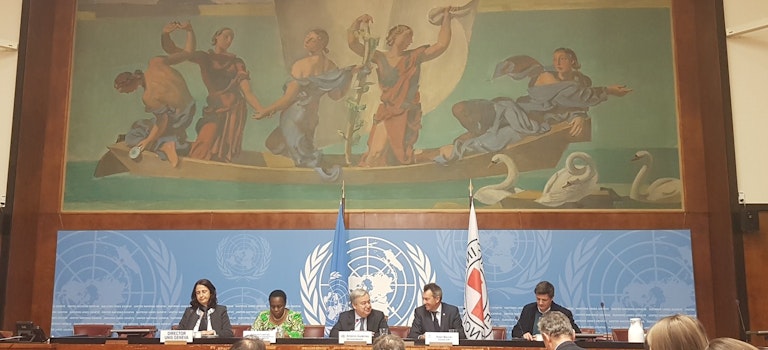The United Nations and the International Red Cross and Red Crescent Movement today pledged to step up action to prevent, end and respond to sexual and gender-based violence in and around conflict.
Through their work in conflict zones around the world, the two organizations see the enormous and lasting damage caused by sexual and gender-based violence, which is used as a tactic of war to dehumanize victims and destabilize entire communities and societies.
“Too often sexual atrocities are accepted as an inevitable by-product of war. This must end. The law is clear: rape and other forms of sexual violence are a violation,” said International Committee of the Red Cross (ICRC) President Peter Maurer, speaking on behalf of the International Red Cross and Red Crescent Movement. “Today we pledge to do better for the survivors of sexual and gender-based violence. We demand an end to sexual atrocities used as a tactic of war; and we demand a change in attitudes that blame survivors, not the perpetrators.”
“The world is growing ever more aware of the ubiquity of sexual and gender-based violence in and around conflict,” said UN Secretary-General António Guterres. “We must do more to prevent and it, and to hold the perpetrators to account. I am proud that the UN and the International Red Cross and Red Crescent Movement are coming together to better address these crimes. We will replace impunity with justice; and indifference with action. Survivors – their experiences, needs and demands – will be at the heart of everything we do.”
The two leaders were accompanied by Julienne Lusenge, a distinguished human rights activist who works with survivors of wartime sexual violence in the Democratic Republic of the Congo.
“It is time to stop using women's bodies as battlefields,” said Lusenge. “I am pleased to join my voice with the United Nations and Red Cross Red Crescent movement, to emphasize the need for direct and adequate action. Direct support to grassroots women’s organizations will enable us to treat victims and survivors in the Democratic Republic of the Congo within hours and provide them with access to legal services, transforming them from victims into agents of change and protectors of humanity.”
At today’s meeting, the United Nations and the International Red Cross and Red Crescent Movement pledged to listen to survivors and victims of these crimes; to enable their voices to be heard; and to support them both directly and through local organizations, particularly women’s organizations, that work in conflict zones.
- The United Nations is directing all staff to promote women’s participation in conflict prevention and resolution and in all formal peace processes;
- The UN is instructing its peace operations around the world to make sure they have policies and systems in place to prevent conflict-related sexual and gender-based violence; and to pursue justice for victims and survivors based on their needs and aspirations;
- The UN is directing its peace operations and where relevant, other field presences to ensure that they are staffed with gender and protection advisers at the appropriate level to respond to this crisis, to provide input into decision-making at senior levels, and to consult with local communities;
- The UN is stepping up efforts to mobilise resources for grassroots organisations, particularly women’s organizations, that are on the frontlines of preventing and responding to conflict-related sexual and gender-based violence, through mechanisms such as the Women, Peace and Humanitarian Fund.
- The International Committee of the Red Cross is today launching an appeal for approximately $27 million in funding to help us better respond to the issue of sexual violence in 14 countries, including expanded services in Colombia, improved responses in Syria and new services in the Central African Republic;
- The International Committee of the Red Cross for the first time ever will place dedicated specialists on conflict-related sexual and gender-based violence in six countries this year to increase the on-ground coordination of our response to the needs of women, men, boys and girls;
- The International Federation of Red Cross and Red Crescent Societies (IFRC) and National Red Cross and Red Crescent Societies will continue to strengthen their efforts to prevent and respond to sexual and gender-based violence through capacity building and deployments of dedicated specialists.
The UN and the International Red Cross and Red Crescent Movement called on governments, who have the primary responsibility to prevent and respond to conflict-related sexual and gender-based violence, to ensure victims and survivors receive adequate care and justice.
Specifically, they urged governments to:
- Ensure there is adequate protection for victims and survivors of sexual and gender-based violence in conflict in their legal frameworks and policies;
- Put measures in place to protect detainees from conflict-related sexual and gender-based violence;
- Provide training for police and armed forces to prevent and address sexual and gender-based violence in and around conflict;
- Investigate and prosecute perpetrators of crimes related to sexual and gender-based violence in conflict;
- Ensure support for organisations working with victims and survivors of such violence;
- Provide survivors and victims with ready access to physical and psychological care.
Above all, they urged governments to be guided by the voices, needs and demands of survivors and victims, and to put them at the heart of prevention and response.
Secretary-General Guterres and President Maurer spoke on the side-lines of the Human Rights Council, where both leaders stressed the need for States to re-commit to international humanitarian law and international human rights law and for a surge in multilateral efforts towards a comprehensive response to sexual and gender-based violence in and around conflict.
More information:
